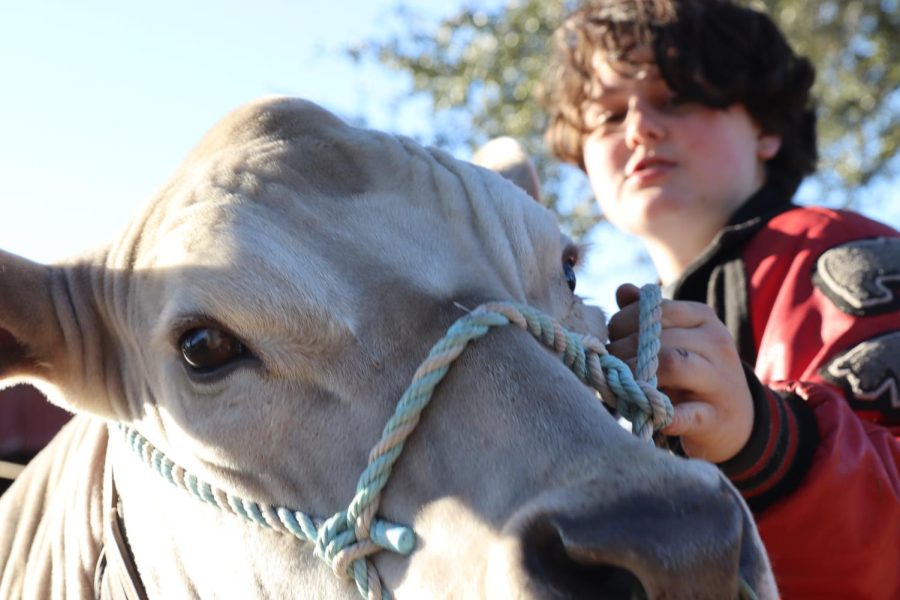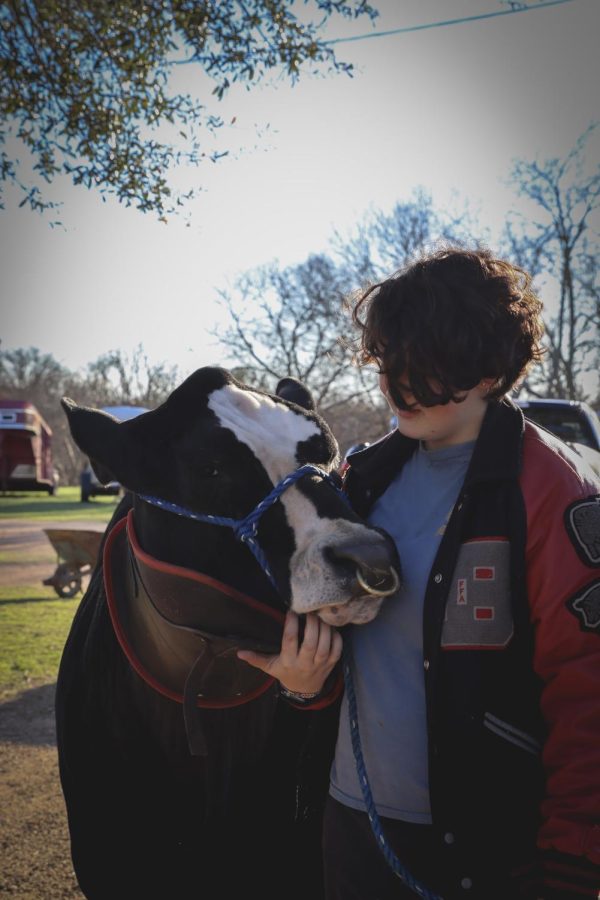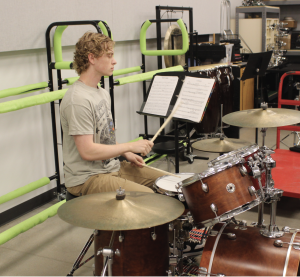FFA arranges interactive experiences
EYE TO EYE: While chained to the small metal fence, Buck patiently waits for Olivas to finish her daily examination of his ears, neck and back, to ensure he is growing properly. Over the course of a year Olivas raises her two steers to livestock show standards gaining them many awards. “I have even been awarded grand champion for my steers, however it was a very small competition,” Olivas said. “And I get breed champion or reserve champion at almost every show. The lowest I’ve ranked is fourth, so I feel I’ve done pretty well even in competitive counties.”
March 16, 2023
Hiking up the hill blanketed in dead grass which acts as a direct pathway to the barn and stables that house animals ranging from turkeys to steers, is a daily experience for students raising livestock through the Future Farmers of America organization.
“Being able to train an animal from the very beginning of their life, where they can’t even walk yet is rewarding to see them go on to win competitions but really seeing your hard work pay off,” Olivas said.
In September, students choose their animals depending on their area of expertise. Students will make the voyage to the barn at the back of campus every day for the next four months.
Accessible both by a small dirt road or football field to refill water, feed or train their animals, rain or shine, until the yearly Travis county livestock show in January when for many FFA students, the journey ends, and their animals adopted or sold. Eva Garzza is an avid member of FFA, who chooses to raise pigs and turkeys.
“I discovered FFA because of my sister. She is a couple of years older than me and in her freshman year of high school she became interested in[agriculture] at the time I wanted to be a vet, and I thought it sounded interesting so I joined the next year in seventh grade and haven’t stopped since,” Garzza said. “[One of the animals] I work with are turkeys, they’re poultry, so it’s relatively simple; you get your birds, you feed them, and get them water. But with pigs, judges are looking for more even with your own showmanship.”
Texas’ unpredictable weather can be a wary obstacle when dealing with animals whose homes are outdoors. The prolonged summer heat waves lasting most years until November is the biggest concern for FFA students as tragic stories discourage carelessness. Madeline Rains frequently comes across issues while raising her bunnies.
“Considering that in Texas it goes from freezing one day to 70 degrees the next, we have to take in the bunnies inside. Bunnies can typically handle cold weather, but once it’s freezing and below you should take them in. But changing their location frequently tends to stress them out and it can be a lot of work,” Rains said. “And in the summer large fans kept on all day long to keep the animals from excessive exhaustion.”
Steers take more dedication and involvement than most animals available to raise through FFA. Setting aside their enormous size, steers are a traditional aggressive animals, so one on one experiences are essential for future livestock shows to run smoothly.
“For steers, there is quite a bit of work you have to do compared to the pigs and lambs I raised last year. I have had both of my steers since May and raised them for a full year they are ten times the size of a lamb, so it is a little more dangerous, but if you work on them when they are young they will be sweet when they’re older, after the bond and trust you build with them,” Olivas said. “The cleaning is ten times what is needed for lambs, overall steers are much more a labor-intensive animal.”
Amelia Olivas, the designated steer expert and she found her passion for agriculture through an unlikely show-and-tell presentation in fifth grade, a simple belt buckle sparked her yearning for competition and a bond with animals. The daughter of two city kids has forced many self-taught moments for Olivas from driving a trailer housing two 500-pound and heavier steers to the inner workings of livestock shows.
“The rundown of livestock shows starts with you signing up online. There are two types of shows, hair shows, which I do in the winter, and no hair shows, which I do in the summer. When you get to the shows you set up your pin where the steers are essentially tied to a fence for the entire day. For hair shows you will wash them to make them nice and fluffy and wait until your class is ready,” Olivas said. “But before the show even starts there is “showmanship” which is how you perform, judges will see how you set up your animals and if you look confident.”
The dedication and outside-of-school requirements FFA participation demands can deter some incoming students however the enormous learning opportunity for those seeking a career in the veterinary field or other jobs affiliated with animals additionally the substantial scholarship available helped change Rains idea of the organization.
“It’s a lot of work choosing to be in FFA, definitely if you raise bigger animals, but I would say that all the different people you meet along the way make the experience really special. Some of my closest friends are in FFA with me and it has made the experience so much more fun,” Rains said. “And really what makes it worth it for me is the experience you get with the animals, and the sense of accomplishment you get after all the time you spent raising these animals.”









